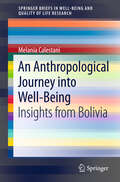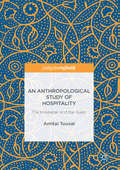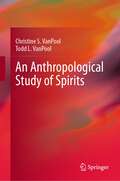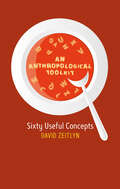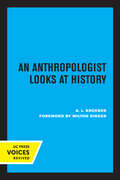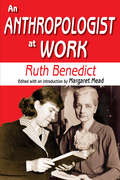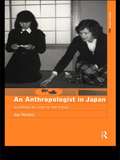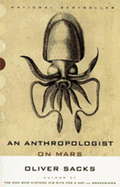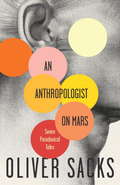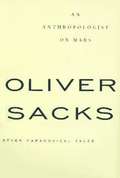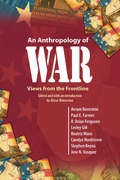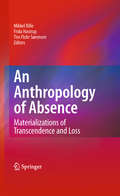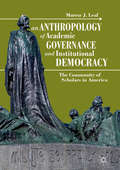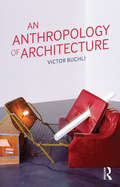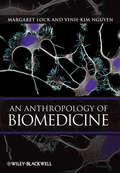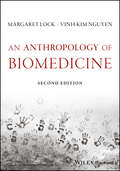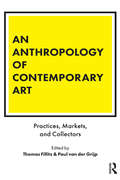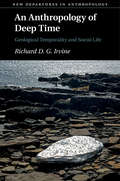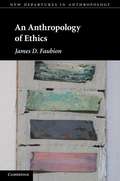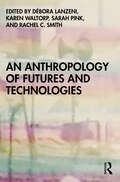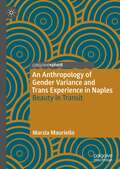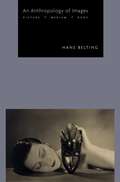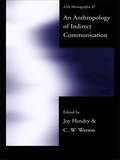- Table View
- List View
An Anthropological Journey into Well-Being: Insights from Bolivia (SpringerBriefs in Well-Being and Quality of Life Research)
by Melania CalestaniThis volume is a unique contribution to the exploration of a new perspective in the study of well-being, which tries to overcome the quantification bias by creating an account of 'the good life' in a specific place. Rather than numbers, this research focuses on local narratives, emphasising the urgent need to include a wider range of methodological approaches when engaging with well-being. The volume demonstrates through the Bolivian case study the value of qualitative research for well-being studies. It shows the potential to integrate predominant quantitative data with qualitative outcomes, such as those emerging through ethnography. It is aimed at academics, researchers and students in well-being/quality of life studies, as well as audiences in the non-profit, governmental and policy in the non-profit, governmental and policy sectors. The book provides new perspectives in achieving better indicators of well-being and quality-of-life.
An Anthropological Study of Hospitality: The Innkeeper and the Guest
by Amitai TouvalThis volume explores recent developments in the practice of hospitality, as well as the curious, precarious relationship between guests and their hosts. Drawing from personal interactions with an aging innkeeper called Herr Klaus and modern Airbnb hostess Gretchen, Amitai Touval offers a touching and illuminating account of how the rise of Airbnb has forged new standards of generosity, hostility, and accountability. An Anthropological Study of Hospitality is a must-read for anyone who has wondered about the intricate social cues involved in such a seemingly simple exchange.
An Anthropological Study of Spirits
by Todd L. VanPool Christine S. VanPoolThis book discusses the cultural importance of spirits, what spirits want, and how humans interact with them, using examples from around the world and through time. Examples range from the vengeful spirits of the Zulu that cast lightning bolts from clear skies to punish wrongdoers, to the benevolent Puebloan Kachina that encourage prosperity, safety, and rain in the arid American Southwest. The case studies illustrate how humans seek to cooperate (or counteract) spirits to heal the physical and spiritual ailments of their people, to divine the truth, or to gain resources. Building from their cross-cultural analyses, the authors further discuss how our physiology and psychology impact our interaction with the spirits. Readers will come away with an appreciation of the beauty and power of the spirits that continue to shape the lives of people around the world.
An Anthropological Toolkit: Sixty Useful Concepts
by David ZeitlynPresenting sixty theoretical ideas, David Zeitlyn asks ‘How to write about anthropological theory without making a specific theoretical argument.’ “David Zeitlyn has written a wryly engaging, short book on, essentially, why we should not become theoretical partisans—that, indeed, being a serious theorist means accepting precisely that principle.”—Michael Herzfeld, Harvard University To answer, he offers a series of mini essays about an eclectic collection of theoretical concepts that he has found helpful over the years. The book celebrates the muddled inconsistencies in the ways that humans live their messy lives. There are, however, still patterns discernible: the actors can understand what is going on, they see an event unfolding in ways that are familiar, as belonging to a certain type and therefore, Zeitlyn suggests, so can researchers. From the introduction: This book promotes an eclectic, multi-faceted anthropology in which multiple approaches are applied in pursuit of the limited insights which each can afford…. I do not endorse any one of these idea as supplying an exclusive path to enlightenment: I absolutely do not advocate any single position. As a devout nonconformist, I hope that the following sections provide material, ammunition and succour to those undertaking nuanced anthropological analysis (and their kin in related disciplines)…. Mixing up or combining different ideas and approaches can produce results that, in their breadth and richness, are productive for anthropology and other social sciences, reflecting the endless complexities of real life. …This is my response to the death of grand theory. I see our task as learning how to deal with that bereavement and how to resist the siren lures of those promising synoptic overviews. This book is relevant to anthropology, communication studies, cultural studies and sociology.
An Anthropologist Looks at History
by A. L. KroeberThis title is part of UC Press's Voices Revived program, which commemorates University of California Press’s mission to seek out and cultivate the brightest minds and give them voice, reach, and impact. Drawing on a backlist dating to 1893, Voices Revived makes high-quality, peer-reviewed scholarship accessible once again using print-on-demand technology. This title was originally published in 1963.
An Anthropologist at Work
by Ruth BenedictAn Anthropologist at Work is the product of a long collaboration between Ruth Benedict and Margaret Mead. Mead, who was Benedict's student, colleague, and eventually her biographer, here has collected the bulk of Ruth Benedict's writings. This includes letters between these two seminal anthropologists, correspondence with Franz Boas (Benedict's teacher), Edward Sapir's poems, and notes from studies that Benedict had collected throughout her life. Since Benedict wrote little, Mead has fleshed out the narratives by adding background information on Benedict's life, work, and the cultural atmosphere of the time.Ruth Benedict formed her own view of the contribution of anthropology before the first steps were taken in the study of how individual human beings, with their given potentialities, came to embody their culture. In her later work, she came to accept and sometimes to use the work in culture and personality that depended as much upon social psychology as upon cultural anthropology. She came to recognize that society - made up of persons or organized in groups - was as important as a subject of study as the culture of a society.This volume, greatly enhanced by Mead's contributions, is a record of what was important to Benedict in her life and work. It is expertly ordered and assembled in a way that will be accessible to students and professionals alike.
An Anthropologist in Japan: Glimpses of Life in the Field (The ASA Research Methods)
by Joy HendryIn this highly personal account Joy Hendry relates her experiences of fieldwork in a Japanese town and reveals a fascinating cross-section of Japanese life. She sets out on a study of politeness but a variety of unpredictable events including a volcanic eruption, a suicide and her son's involvement with the family of a poweful local gangster, begin to alter the direction of her research. The book demonstrates the role of chance in the acquisition of anthropological knowledge and demonstrates how moments of insight can be embedded in everyday activity. An Anthropologist in Japan illuminates the education system, religious beliefs, politics, the family and the neighbourhood in modern Japan.
An Anthropologist on Mars
by Oliver SacksTo these seven narratives of neurological disorder Dr. Sacks brings the same humanity, poetic observation, and infectious sense of wonder that are apparent in his bestsellers Awakenings and The Man Who Mistook His Wife for a Hat. These men, women, and one extraordinary child emerge as brilliantly adaptive personalities, whose conditions have not so much debilitated them as ushered them into another reality.
An Anthropologist on Mars
by Oliver SacksTo these seven narratives of neurological disorder Dr. Sacks brings the same humanity, poetic observation, and infectious sense of wonder that are apparent in his bestsellers Awakenings and The Man Who Mistook His Wife for a Hat. These men, women, and one extraordinary child emerge as brilliantly adaptive personalities, whose conditions have not so much debilitated them as ushered them into another reality.
An Anthropologist on Mars: Seven Paradoxical Tales
by Oliver SacksHere are seven detailed and fascinating portraits of neurological patients, including a surgeon consumed by the compulsive tics of Tourette's syndrome unless he is operating; an artist who loses all sense of color in a car accident, but finds a new sensibility and creative power in black and white; and an autistic professor who cannot decipher the simplest social exchange between humans, but has built a career out of her intuitive understanding of animal behavior.
An Anthropologist on Mars: Seven Paradoxical Tales
by Oliver SacksTo these seven narratives of neurological disorder Dr. Sacks brings the same humanity, poetic observation, and infectious sense of wonder that are apparent in his bestsellers Awakenings and The Man Who Mistook His Wife for a Hat. These men, women, and one extraordinary child emerge as brilliantly adaptive personalities, whose conditions have not so much debilitated them as ushered them into another reality.
An Anthropology Of War
by Alisse WaterstonAs we move deeper into the twenty-first century, power, lethal force, and injustice continue to explode violently into war, and the prospects for lasting peace look even bleaker. The horrors of modern warfare - the death, dehumanization, and destruction of social and material infrastructures - have done little to bring an end to armed conflict. In this volume, leading chroniclers of war provide thoughtful and powerful essays that reflect on their ethnographic work at the frontlines. The contributors recount not only what they have seen and heard in war zones but also what is being read, studied, analyzed and remembered in such diverse locations as Colombia and Guatemala, Israel and Palestine, Iraq, Afghanistan, and Haiti. In detailed reports from the field, they reflect on the important issue of "accountability" and offer explanations to discern causes, patterns, and practices of war. Through this unique lens, the contributors provide the insight and analysis needed for a deeper understanding of one of the greatest issues of our times. Contributors: Avram Bornstein, Paul E. Farmer, R. Brian Ferguson, Lesley Gill, Beatriz Manz, Carolyn Nordstrom, Stephen Reyna, Jose N. Vasquez
An Anthropology of Absence: Materializations of Transcendence and Loss
by Frida Hastrup Mikkel Bille Tim Flohr SoerensenIn studying material culture, anthropologists and archaeologists use meaningful physical objects from a culture to help understand the less tangible aspects of that culture, such as societal structure, rituals, and values. What happens when these objects are destroyed, by war, natural disaster, or other historical events? Through detailed explanations of eleven international case studies, the contributions reveal that the absence of objects can be just as telling as their presence, while the objects created to memorialize a loss also have important cultural implications. Covering everything from organ donation, to funerary rituals, to prisoners of war, The Archaeology of Absence is written at an important intersection of archaeological and anthropological study. Divided into three sections, this volume uses the "presence" of absence to compare cultural perceptions of: material qualities and created memory, the mind/body connection, temporality, and death. This rich text provides a strong theoretical framework for anthropologists and archaeologists studying material culture.
An Anthropology of Academic Governance and Institutional Democracy: The Community of Scholars in America
by Murray J. LeafThis anthropological study of university governance organizations has four main purposes. It aims to describe the principles of effective faculty governance organizations and shared governance; to help mobilize opposition to a large and extremely well-funded system of political attacks aimed at destroying faculty governance organizations; to demonstrate the value of the theory of human social organizations; and to enable universities to become more effective in generating the intellectual advances we must make in order to solve the current global crisis of sustainability and political instability. Political democracy depends on an educated public, and academic democracy is integral to producing such knowledge.
An Anthropology of Architecture
by Victor BuchliEver since anthropology has existed as a discipline, anthropologists have thought about architectural forms. This book provides the first overview of how anthropologists have studied architecture and the extraordinarily rich thought and data this has produced.With a focus on domestic space - that intimate context in which anthropologists traditionally work - the book explains how anthropologists think about public and private boundaries, gender, sex and the body, the materiality of architectural forms and materials, building technologies and architectural representations. Each chapter uses a broad range of case studies from around the world to examine from within anthropology what architecture 'does' - how it makes people and shapes, sustains and unravels social relations.An Anthropology of Architecture is key reading for students of anthropology, material culture, geography, sociology, architectural theory, design and city planning.
An Anthropology of Biomedicine
by Margaret Lock Vinh-Kim NguyenAn Anthropology of Biomedicine is an exciting new introduction to biomedicine and its global implications. Focusing on the ways in which the application of biomedical technologies bring about radical changes to societies at large, cultural anthropologist Margaret Lock and her co-author physician and medical anthropologist Vinh-Kim Nguyen develop and integrate the thesis that the human body in health and illness is the elusive product of nature and culture that refuses to be pinned down. Introduces biomedicine from an anthropological perspective, exploring the entanglement of material bodies with history, environment, culture, and politics Develops and integrates an original theory: that the human body in health and illness is not an ontological given but a moveable, malleable entity Makes extensive use of historical and contemporary ethnographic materials around the globe to illustrate the importance of this methodological approach Integrates key new research data with more classical material, covering the management of epidemics, famines, fertility and birth, by military doctors from colonial times on Uses numerous case studies to illustrate concepts such as the global commodification of human bodies and body parts, modern forms of population, and the extension of biomedical technologies into domestic and intimate domains Winner of the 2010 Prose Award for Archaeology and Anthropology
An Anthropology of Biomedicine
by Margaret Lock Vinh-Kim NguyenIn this fully revised and updated second edition of An Anthropology of Biomedicine, authors Lock and Nguyen introduce biomedicine from an anthropological perspective, exploring the entanglement of material bodies with history, environment, culture, and politics. Drawing on historical and ethnographic work, the book critiques the assumption made by the biological sciences of a universal human body that can be uniformly standardized. It focuses on the ways in which the application of biomedical technologies brings about radical changes to societies at large based on socioeconomic inequalities and ethical disputes, and develops and integrates the theory that the human body in health and illness is not an ontological given but a moveable, malleable entity. This second edition includes new chapters on: microbiology and the microbiome; global health; and, the self as a socio-technical system. In addition, all chapters have been comprehensively revised to take account of developments from within this fast-paced field, in the intervening years between publications. References and figures have also been updated throughout. This highly-regarded and award-winning textbook (Winner of the 2010 Prose Award for Archaeology and Anthropology) retains the character and features of the previous edition. Its coverage remains broad, including discussion of: biomedical technologies in practice; anthropologies of medicine; biology and human experiments; infertility and assisted reproduction; genomics, epigenomics, and uncertain futures; and molecularizing racial difference, ensuring it remains the essential text for students of anthropology, medical anthropology as well as public and global health.
An Anthropology of Contemporary Art: Practices, Markets, and Collectors (Criminal Practice Ser.)
by Thomas Fillitz Paul van der GrijpDrawing on the exciting developments that have occurred in the anthropology of art over the last twenty years, this study uses ethnographic methods to explore shifts in the art market and global contemporary art. Recognizing that the huge diversity of global phenomena requires research on the ground, An Anthropology of Contemporary Art examines the local art markets, biennials, networks of collectors, curators, artists, patrons, auction houses, and museums that constitute the global art world.Divided into four parts – Picture and Medium; World Art Studies and Global Art; Art Markets, Maecenas and Collectors; Participatory Art and Collaboration – chapters go beyond the standard emphasis on Europe and North America to present first-hand fieldwork from a wide range of areas, including Brazil, Turkey, and Asia and the Pacific.With contributions from distinguished anthropologists such as Philippe Descola and Roger Sansi Roca, this book provides a fresh approach to key topics in the discipline. A model for demonstrating how contemporary art can be studied ethnographically, this is a vital read for students in anthropology of art, visual anthropology, visual culture, and related fields.
An Anthropology of Deep Time: Geological Temporality and Social Life (New Departures in Anthropology)
by Richard D. IrvineIn the face of debates about the Anthropocene - a geological epoch of our own making - and contemporary concerns about ecological crisis and the Sixth Mass Extinction, it is more important than ever to locate the timeframe of human activity within the deep time of planetary history. This path-breaking book is a timely critical review of the anthropology of time, exploring our human relationship with the timescale of geological formation. Richard D. G. Irvine shows how the time-horizons of social life are a matter of crucial concern, and lays bare the ways in which human activity becomes severed from the long-term geological and ecological rhythms on which it depends.
An Anthropology of Ethics
by James D. FaubionThrough an ambitious and critical revision of Michel Foucault's investigation of ethics, James Faubion develops an original program of empirical inquiry into the ethical domain. From an anthropological perspective, Faubion argues that Foucault's specification of the analytical parameters of this domain is the most productive point of departure in conceptualizing its distinctive features. He further argues that Foucault's framework is in need of substantial revision to be of genuinely anthropological scope. In making this revision, Faubion illustrates his program with two extended case studies: one of a Portuguese marquis and the other of a dual subject made up of the author and a millenarian prophetess. The result is a conceptual apparatus that is able to accommodate ethical pluralism and yield an account of the limits of ethical variation, providing a novel resolution of the problem of relativism that has haunted anthropological inquiry into ethics since its inception.
An Anthropology of Futures and Technologies
by Sarah Pink Karen Waltorp Débora Lanzeni Rachel C. SmithThis book examines emerging automated technologies and systems and the increasingly prominent roles that each plays in our lives and our imagined futures. It asks how technological futures are being constituted and the roles anthropologists can play in their making; how anthropologists engage with emerging technologies within their fieldwork contexts in research which seeks to influence future design; how to create critical and interventional approaches to technology design and innovation; and how a critical anthropology of the way that emerging technologies are experienced in everyday life circumstances offers new insights for future-making practices. In pursuing these questions, this book responds to a call for new anthropologies that respond to the current and emerging technological environments in which we live, environments for which thinking critically about the possible, plausible, and impossible futures are no longer sufficient. Taking the next step, this book asserts that anthropology must now propose alternative ways, rooted in ethnography, to approach and engage with what is coming and to contest dominant narratives of industry, policy, and government, and to respond to our contemporary context through a public, vocal, and interventional approach.
An Anthropology of Gender Variance and Trans Experience in Naples: Beauty in Transit
by Marzia MaurielloThis book recounts the author’s fieldwork among the trans and gender-variant communities in Naples. This is where a gender-variant figure, the femminiello, has found a safe environment within the city’s historical poorest neighborhoods, the so-called “quartieri popolari”, which were and continue to be culturally and socially connoted. The femminielli, who can be read as “suspended” figures between the feminine and the masculine, provide the background for a discourse on the meanings that genders and sexualities have assumed in modern Naples. This is done with significant openings to theoretical reasoning that is both extraterritorial and multidisciplinary. Starting from the micro context, the aim of the book is to explore the breadth and complexity of the gender variant and trans experience, with particular reference to the changing meanings of the body, which are also tied to the collective images of beauty in contemporary times.
An Anthropology of Images: Picture, Medium, Body
by Hans BeltingA compelling theory that places the origin of human picture making in the bodyIn this groundbreaking book, renowned art historian Hans Belting proposes a new anthropological theory for interpreting human picture making. Rather than focus exclusively on pictures as they are embodied in various media such as painting, sculpture, or photography, he links pictures to our mental images and therefore our bodies. The body is understood as a "living medium" that produces, perceives, or remembers images that are different from the images we encounter through handmade or technical pictures. Refusing to reduce images to their material embodiment yet acknowledging the importance of the historical media in which images are manifested, An Anthropology of Images presents a challenging and provocative new account of what pictures are and how they function.The book demonstrates these ideas with a series of compelling case studies, ranging from Dante's picture theory to post-photography. One chapter explores the tension between image and medium in two "media of the body," the coat of arms and the portrait painting. Another, central chapter looks at the relationship between image and death, tracing picture production, including the first use of the mask, to early funerary rituals in which pictures served to represent the missing bodies of the dead. Pictures were tools to re-embody the deceased, to make them present again, a fact that offers a surprising clue to the riddle of presence and absence in most pictures and that reveals a genealogy of pictures obscured by Platonic picture theory.
An Anthropology of Indirect Communication (ASA Monographs #Vol. 37)
by Joy Hendry C. W. WatsonSometimes we convey what we mean not by what we say but by what we do. This type of indirect communication is sometimes called 'indirection'. From patent miscommunication, through potent ambiguity to pregnant silence this incisive collection examines from a rare anthropological perspective the many aspects of indirect communication. From a Mormon Theme Park to carnival time on Montserrat the contributors analyse indirection by illustrating how food, silence, sunglasses, martial arts and rudeness call constitute powerful ways of conveying meaning. An Anthropology of Indirect Communication is an engaging text which provides a challenging introduction to this subject.
